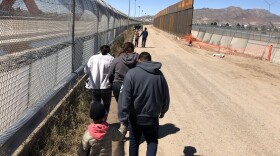Despite the chaotic end to the regular Texas legislative session — with all eyes on the impeachment of Ken Paxton and the failure of priority bills — several less attention-grabbing bills did successfully make it through both chambers and onto the governor’s desk.
One of those is the so-called “no kids in cuffs” bill, Senate Bill 133. It bans school police officers and security guards from restraining, Tasing or using chemical irritants like pepper spray on students below sixth grade “unless the student poses a serious risk of harm to the student or another person.”
The measure is one of several championed by disability rights advocates at the beginning of the session, and the only one to pass.
“This was a big win,” said Jolene Sanders with the Coalition for Texans with Disabilities. “A lot of us would have liked to see it go a little bit farther. But it's definitely the first step in the right direction to kind of crack down on some of these uses of force and restraint that we know all too well are disproportionately used on students with disabilities and students of color.”
According to the most recently available data reported to the U.S. Department of Education’s Office of Civil Rights, 81% of Texas students physically restrained in schools have an individualized education plan due to a disability.
Sanders said she and other advocates would like to have also seen measures pass that hold teachers, principals and other school staff accountable for abusing the use of restraints.
“We're talking about who the kids with disabilities have the most interaction with, and that would be paraprofessionals and other educators,” Sanders said. “We're still, I would say confidently, not tackling the majority of restraints that are happening.”
At a press conference called by disability rights advocates in late January, parents described obtaining video footage that showed their child being repeatedly and forcefully restrained by teachers and paraprofessionals.
Thelma Lira said her preschooler was regularly “tied down to his chair throughout the day.” Jeanna TenBrink said her middle schooler was put face down on the floor with her arms behind her back. Both of their children are autistic.
Advocates — and bill sponsors like Republican Rep. Lacey Hull and Democratic Rep. Mary González — would also like to have passed a ban on restraining students face up or face down on the floor in what’s known as prone and supine positions.
“These are the most dangerous types of restraint. They restrict breathing. They've resulted in countless injuries and, in the worst cases, even deaths of students with disabilities,” Sanders said.
George Floyd died while restrained in the prone position.
Although advocates will continue to push for more action, Sanders said the “no kids in cuffs” bill will have a positive impact on students, especially students with disabilities, in part because it helps disrupt the school to prison pipeline.
“These are kids where their wrists are too small to even be put in handcuffs half the time. So, it's a no brainer,” Sanders said. “But in terms of kind of slowing or diverting children away from even more punitive settings where we know it's really hard to come back from, this is a huge step in the right direction.”
Gov. Greg Abbott has until June 18 to act on SB 133. Unless he vetoes the bill, it will take effect immediately. The measure passed with overwhelming bipartisan support from both the House and Senate.
One factor that could complicate implementation of the bill is the simultaneous passage of House Bill 3, which requires an armed security guard at every school in the state. That measure is likely to require schools to hire or redistribute their police and security staff.
Sanders said she’ll look out for what kind of guidance the Texas Education Agency provides to school districts on SB 133 and HB 3 — both to make sure they’re aware of the bills and know how to implement them.
“Because we can pass a million bills. But if they're not being enforced, then we still have kids who are experiencing harm,” she added.
Her organization is especially worried about the impact of the armed security provision in HB 3 because they fear it will lead to more students with disabilities and students of color being arrested.
Copyright 2023 Texas Public Radio. To see more, visit Texas Public Radio.









